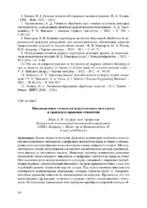| dc.contributor.author | Лойко, А. И. | ru |
| dc.coverage.spatial | Минск | ru |
| dc.date.accessioned | 2024-04-10T05:48:16Z | |
| dc.date.available | 2024-04-10T05:48:16Z | |
| dc.date.issued | 2024 | |
| dc.identifier.citation | Лойко, А. И. Инновационные технологии искусственного интеллекта и гражданско-правовые отношения = Innovative technologies of artificial intelligence and civil relations / А. И. Лойко // XII Форум вузов инженерно-технологического профиля Союзного государства : сборник научных трудов / Белорусский национальный технический университет ; ред. Т. В. Матюшинец. – Минск : БНТУ, 2024. – С. 116-121. | ru |
| dc.identifier.uri | https://rep.bntu.by/handle/data/141774 | |
| dc.description.abstract | Целью является изучение феномена асимметрии динамики технологий искусственного интеллекта и цифровых институтов права и этики, и обоснование роли самоорганизации пользователя на основе цифрового этикета. Методологическую основу исследования составляют аналитические методы сравнительного анализа и системного анализа. Выявлены причины асимметрии динамики технологий искусственного интеллекта и цифровых институтов права и этики. Они заключаются в неопределенности ситуации, связанной с широким употреблением термина «искусственный интеллект» на фоне признания тезиса о том, что подобный уровень технологий еще не создан. Под искусственным интеллектом понимаются компьютерные программы, которые согласно тесту А. Тьюринга, способны адекватно отвечать на поставленные им вопросы. Признается, что эти компьютерные программы относятся к уровню слабого искусственного интеллекта. Но поскольку применение этих программ приобрело широкий спектр в области экономики (маркетинга, менеджмента, логистики, промышленного интернета) в условиях перехода на цифровые платформы безбарьерной среды, то были обнаружены риски цифровизации. Также констатировано отставание цифрового права от технологической динамики. Вследствие этого в условиях переходного периода все большая роль отводится институту самоорганизации пользователей сети. | ru |
| dc.publisher | БНТУ | ru |
| dc.title | Инновационные технологии искусственного интеллекта и гражданско-правовые отношения | ru |
| dc.title.alternative | Innovative technologies of artificial intelligence and civil relations | ru |
| dc.type | Working Paper | ru |
| local.description.annotation | To study the phenomenon of asymmetry in the dynamics of artificial intelligence technologies and digital institutions of law and ethics and substantiate the role of user self-organization based on digital etiquette. The methodological basis of the study consists of analytical methods of comparative analysis and system analysis. The reasons for the asymmetry in the dynamics of artificial intelligence technologies and digital institutions of law and ethics have been identified. They lie in the uncertainty of the situation associated with the widespread use of the term “artificial intelligence” against the backdrop of recognition of the thesis that a similar level of technology has not yet been created. Artificial intelligence refers to computer programs that, according to A. Turing’s test, are capable of adequately answering questions posed to them. It is recognized that these computer programs belong to the level of weak artificial intelligence. But since the use of these programs has acquired a wide range in the field of economics (marketing, management, logistics, industrial Internet) in the context of the transition to digital platforms of a barrier-free environment, the risks of digitalization were discovered. It was also noted that digital law lags behind technological dynamics. As a result, during the transition period, an increasingly important role is given to the institution of self-organization of network users. | ru |

